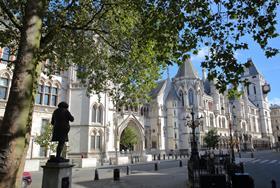
A mother whose rape allegation was wrongly dismissed is asking the High Court for permission to speak out about her case.
Last year a family court judge found that the woman’s ex-partner had raped her and stripped him of parental responsibility for their child. The judge ordered that the boy’s surname should be changed to that of his mother and that the father should pay £30,000 towards the mother’s legal fees.
In an earlier ruling, however, a different judge had dismissed her allegation of rape, when the father had accused her of ‘parental alienation’.
The case was one of the first in which the court made a transparency order to allow limited media reporting of the case. While the transparency order allowed the press to report and to obtain quotes from the mother, it did not allow the mother to write or speak about the case herself.
Today she will ask the High Court to vary the transparency order to permit her to write media articles under a pseudonym, and to accept an invitation from the Children and Family Court Advisory and Support Service (CAFCASS) to speak at a women’s rights and children’s rights event.
In court papers seen by the Gazette, her barrister Charlotte Proudman states that the mother ‘seeks to exercise her right to “tell her story” in a safe way whilst balancing [her child’s] and her right to privacy and freedom of expression’. Proudman explains that the mother ‘seeks to advocate on behalf of victims of domestic abuse (both mothers and children) at events, by raising awareness, and helping to educate others’.
The ‘continued silencing of her amounts to further coercive control exercised by and through the family courts’, she adds.
The barrister submits that the case is of ‘significant public importance – and personal importance to’ the mother, stating that it is ‘imperative that her right to speak is acknowledged, and her right to personal autonomy and agency is respected’.
Having her ‘choice to personal autonomy restricted’ could have lasting psychological effects, adding to her stress as a ‘victim of abuse’. Proudman adds that talking about trauma is often a ‘crucial part of any healing process’ and can be a ‘a cathartic experience’ which, if the mother is denied, may ‘potentially hinder recovery and healing, and prolong suffering’.
The barrister argues that the case is of important public interest because it shows how the family justice system can ‘fail’ children by viewing cases through a ‘parental alienation’ lens and ignoring domestic abuse allegations – and also how the courts can ‘properly safeguard children and victim parents” when they address rape and domestic abuse.
It is understood that the child’s guardian supports the mother’s right to an article and that the father is neutral and will not oppose the application.











